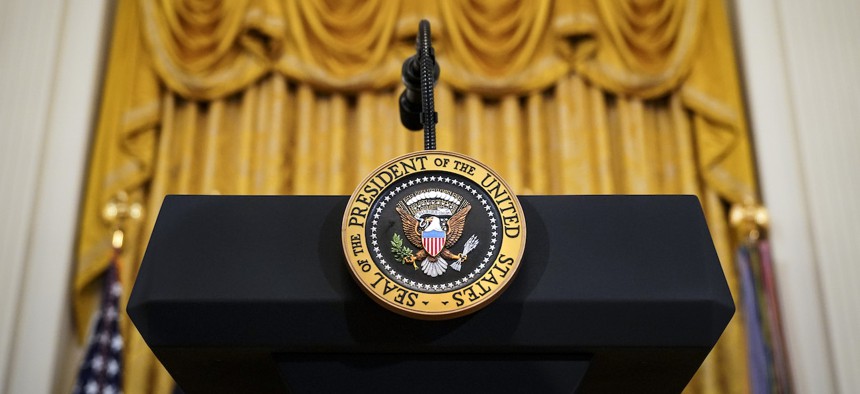
There’s also a long game in the works to change the rules of the civil service, writes Donald Kettl. Drew Angerer/Getty Images
‘Neutral competence,’ partisanship and efforts to overhaul the civil service
COMMENTARY | One scholar argues that a radical movement to shift powers to the president would be disastrous for the federal workforce.
You might think that the initiative to convert career civil service employees to political appointees might have died at the end of the Trump administration. You’d be wrong.
As the 2024 presidential campaign gets into gear, conservatives are playing a short game to bring that plan back. But there’s also a long game in the works to change the rules of the civil service, which would radically transform the constitutional balance of powers. It would be a huge mistake to underestimate either gambit.
Here’s the short game. The Heritage Foundation has a long and very detailed proposal for bringing back Schedule F, the plan to turn careerists with policy roles into political appointees. James Sherk, who authored the Trump Schedule F executive order, has written a meticulous blog, “Tales from the Swamp,” which describes how he believes federal officials resisted the Trump administration’s policy ideas. Existing civil service rules, he writes “prevent meaningful accountability.”
His goal, he writes, is “returning to the original vision for the civil service: merit-based hiring and straightforward removals.” The analysis builds on a singular proposition: “Political appointees cannot simply remove intransigent employees.” Moreover, “The reformers who created the civil service wanted to avoid patronage hiring, but they also feared removal protections would entrench incompetence and insubordination.”
If the truth be told, virtually every federal manager has a tale of a poorly performing employee that they either couldn’t rid themselves of—or that they simply concluded would be too much trouble to try to dismiss. Along with many conservatives, Sherk argues that “Congress should make federal employees at-will once again,” he writes.
After all, he notes, federal employees didn’t get the right to appeal adverse decisions until the 1940s. And, in the meantime, he says that federal agencies ought to greatly expand the use of “Schedule C” authority for positions influencing policy. Schedule C employees can be dismissed at will.
But even more important is the long game the conservatives are playing. Their goal is nothing less than to establish that all federal government employees serve at the pleasure of the president—and, therefore, can be readily dismissed.
After all, the Declaration of Independence contends, in its second paragraph, that governments derive “their just powers from the consent of the governed.”
Since the passage of the Pendleton Act in 1883, which established the civil service, the system has been based on the idea of “neutral competence,” which holds that the obligation of administrators is to implement the president’s policies, using their professional skills to translate the policy of elected officials into results without a tinge of partisanship.
However, Sherk contends, “an antagonistic minority” has upset that principle. This minority, he says, works quietly behind the scenes to upset the links from voters to the president and, from there, to the work of the bureaucracy.
This two-part argument has potentially revolutionary implications, and it would radically shift the balance of power in the American political system.
In Article II of the Constitution, the founders wrote that the president “shall take Care that the laws be faithfully executed, and shall Commission all the Officers of the United States.” As the founders were debating the Constitution in 1789, moreover, James Madison said that “the lowest officers, the middle grade, and the highest, will depend, as they ought, on the president.”
The long game envisions that Congress would retain its oversight powers over the executive branch. But because Congress staggers on every substantive decision it faces, the legislative vacuum creates a huge opportunity for the expansion of the president’s power.
The federal courts would retain their role in the system. However, legislation that granted the president the expanded powers that the conservatives want would effectively deal the courts out of this balance-of-power question.
Moreover, even falling short of that big step, there are moderates like Phillip Howard who contend that public employee unions are not accountable to the president. That, in turn, interferes with the president’s “take care” powers. It therefore makes the unions unconstitutional, Howard contends. A court case advancing that argument is in the works.
Where does this all lead? The short game could be launched immediately on the swearing-in of a new Republican president in January 2025. If the Republicans also take the House and Senate, the road would be clear for the kind of radical shift of powers to the president that the conservatives envision.
If the Democrats win the presidency, the short game would be delayed, but conservative think tanks would surely continue the campaign from the trenches as they awaited their chance. The conservatives’ efforts would then move in the medium term to the courts, with an attack on public employee unions.
The right has enormous financial strength and intellectual firepower, and these forces aren’t going away. If they don’t win in the short run, they won’t let up. The 50-year campaign against Roe v. Wade demonstrates the value of this persistence.
Given the relative lack of financial support for counter-efforts in the center and on the left, and the struggle to mount both enthusiasm and ideas that contest the right’s most sweeping plans, it would be foolhardy to bet against the odds that the right, in time, would win the battle.
The result would be the biggest shift in the constitutional balance of powers since Madison crafted it back in 1789.
Donald F. Kettl is professor emeritus and former dean of the University of Maryland School of Public Policy. He is the co-author, with William D. Eggers, of Bridgebuilders: How Government Can Transcend Boundaries to Solve Big Problems.







